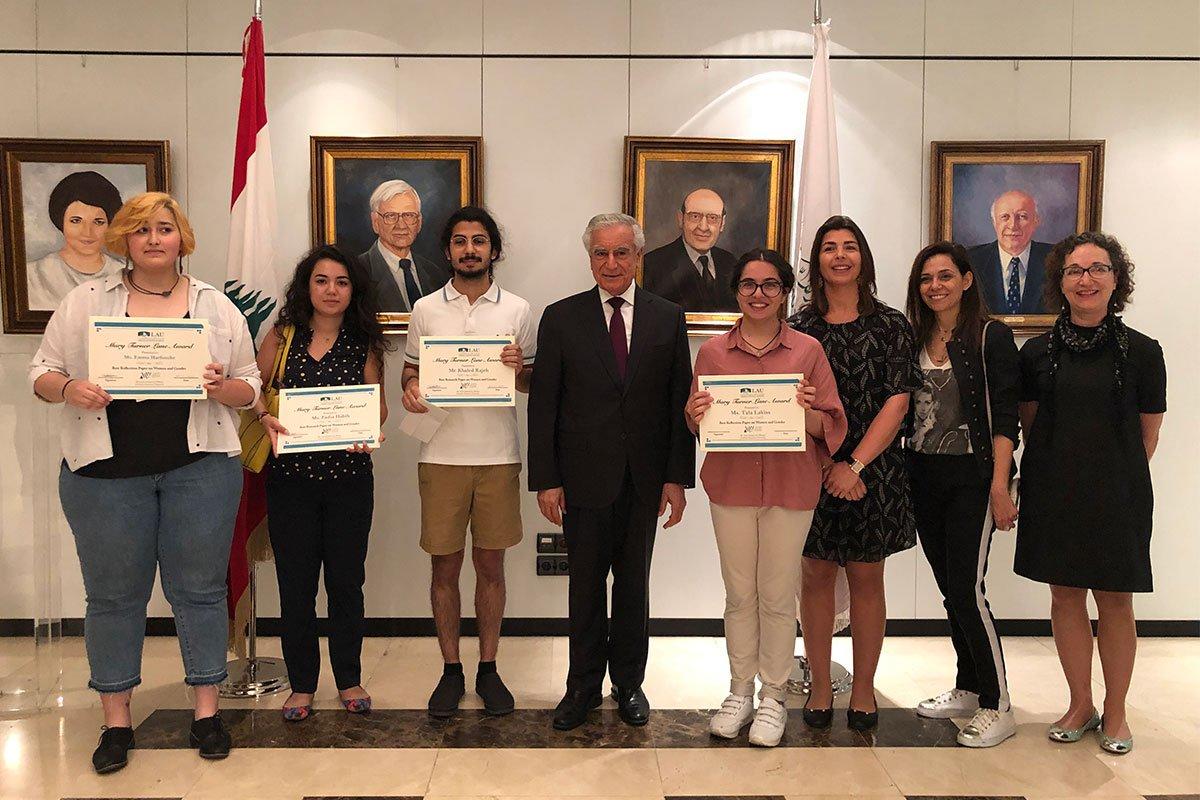Students Recognized for Papers on Gender and Women Studies
The Arab Institute for Women celebrates and rewards the work of LAU students at the Mary Turner Lane Award Ceremony.
In what has become a tradition for the Arab Institute for Women (AiW), LAU graduate and undergraduate students from across the disciplines were invited to submit their papers for the Mary Turner Lane Award. Six winners from the past two academic years were announced and celebrated on Beirut campus.
Named after the late founder of the women’s studies program at the University of North Carolina at Chapel Hill, the award was established by her daughter, Dr. Mary Ellen Lane, to raise awareness about the importance of employing a gender lens in research and literature, as well as furthering research in the field of gender and women’s studies. At the ceremony, LAU President Joseph G. Jabbra spoke about the life and legacy of Turner Lane, inviting attendees to look at her “as an anchor and role model in the face of rapid change.”
In her speech, AiW Director Myriam Sfeir quoted Turner Lane, who once said: “There has been neglect, bias and omission in disciplines which should include the study of women. Hence, academia is the vehicle that leads to activism.” And that, Sfeir pointed out, has been precisely the institute’s privilege; “working at the intersection of academia and activism.”
In the past two years, 58 students had submitted their papers for the award. “Topics were varied, the pieces were poignant and ever-so-timely,” declared Sfeir. Addressing the students, she commended their work on multiple levels. “You challenged the status quo and refused to be silenced, you left no stone unturned, highlighting themes that make up our daily struggle for gender equality, and you wrote about personal experiences, biases and counter-narratives.”
Themes spanned gender and inequality in legal, political and economic contexts, domestic abuse, child marriage, sexuality, honor killing, and sexual harassment – to name a few – and students had the choice of two categories: a reflective piece in a creative or journalistic style, or a research paper.
As it turned out, students excelled in both categories.
One of the winners, English major Khaled Rajeh got his inspiration from The Moral Landscape by Sam Harris. “My paper, which took Harris’s theory and applied it to the Arab world, talks about how philosophies that pose as feminist could sometimes actually harm women’s agency a lot more than they help them.”
Another winner, graduate student in Interdisciplinary Gender Studies Fadia Habib spoke about her research paper which tackled early marriage in the refugee community. “Inspired by feminist writers such as Simone de Beauvoir, I analyzed child marriage from the lens of gender activists,” she explained.
Reiterating AiW’s support for and pride in the winners and contestants alike, Sfeir said: “Through your papers, you succeeded in making Mary Turner Lane’s vision a reality – you facilitated the work that we do in mainstreaming gender at LAU, adding to the body of knowledge in this field. You make us proud.”
A selection of student papers will be published in AiW’s flagship journal Al Raida.
